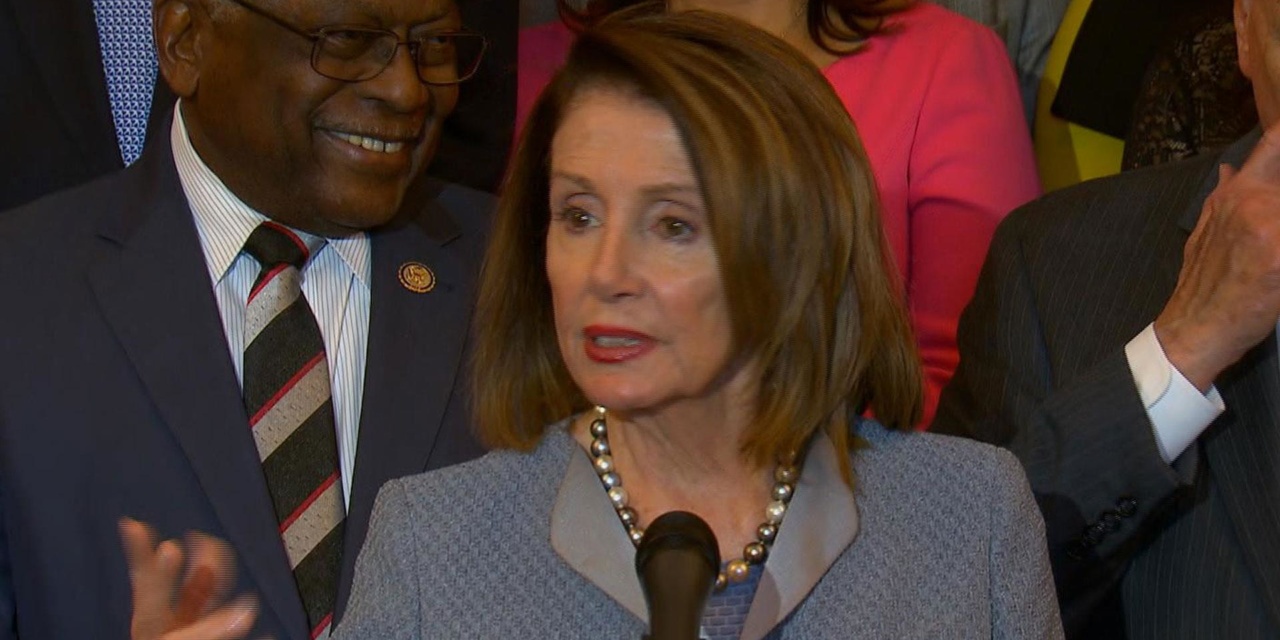House Speaker Nancy Pelosi introduce legislation to bolster health care provision, March 26, 2019
Unable to repeal ObamaCare in Congress, the Trump Administration will try to bury it in the courts.
The Administration will ask a federal appeals court to rule the Affordable Care Act is invalid. The notice to the court was filed late Monday by the Justice Department.
On Tuesday, House Speaker Nancy Pelosi introduced a bill to lower health insurance premiums, strengthen protections for people with pre-existing medical conditions, and ban the sale of “junk insurance”.
The bill overturns a Trump order from August that expands the market for sales of short-term insurance plans that do not have to cover prescription drugs, maternity care, drug abuse treatment, or pre-existing conditions. It increases tax credits to help low- and middle-income people pay premiums, and provides cost-sharing reductions for lower deductibles, co-payments, and out-of-pocket costs.
At Tuesday’s news conference, Democrats were eager to remind reporters that Mr. Trump said in the 2018 campaign that “Republicans will always protect patients with pre-existing conditions.”
A Healthcare Risk to Millions
The Administration’s intervention is in a lawsuit filed by Republican attorneys general in Texas and other states after Congress failed in 2017 to repeal the Affordable Care Act while reducing the ACA’s tax penalty for people who do not have insurance to zero. The suit contended that the absence of the tax penalty rendered ObamaCare’s “individual mandate”, the requirement that most Americans have insurance, unconstitutional.
The lawsuit argues that without a requirement to purchase insurance, the ACA cannot insist that insurance companies cover pre-existing medical conditions and “essential health benefits” such as maternity care and prescription drugs.
A Texas judge invalidated the ACA, including expansion of Medicaid and subsidies to help low- and middle-income people buy insurance. On Monday the Justice Department, which first said that only parts of the law such as protection for pre-existing conditions should be removed, expanded its position to cover all of ObamaCare.
Some Republican legislators opposed the step. Rep. Tom Reed said:
Not only is this a poor political move, this decision hurts real people who will unfairly lose their health insurance coverage as a result. We need to work to find ways to fix our health care system — not blow it up.
Sen. Susan Collins, whose vote was key in preventing the repeal of ObamaCare in 2017, summarized, “I thought it was bad enough when last year they wouldn’t defend parts of the law, including the parts protecting people with pre-existing conditions. This goes far beyond that and I think was a huge mistake.”
Trump allies were caught by surprise. House Minority Leader Kevin McCarthy responded, “I haven’t read through what they — was it last night?” before defending Trump.
A “person in the room” said that, at Trump’s closed-door meeting wtih GOP legislators in the Capitol, the reception was muted.
But Trump — boosted by the success of Attorney General William Barr’s spin on the yet-to-be-released Mueller Report on Trump-Russia links — campaigned on Twitter:
The Republican Party will become “The Party of Healthcare!”
— Donald J. Trump (@realDonaldTrump) March 26, 2019
Health care experts and lawyers criticized the Administration’s move as irresponsible and damaging. Professor Timothy Jost explained:
The Justice Department’s position is mind-boggling. The Affordable Care Act affects the whole health care system, including Medicare, Medicaid, the Food and Drug Administration, the Indian Health Service and much more. The administration is asking the appeals court to invalidate the entire law without really knowing exactly what that would mean. It’s reckless.
Since 2010, the ACA has overhauled Medicare payments, encouraged innovation in delivery of health care, and fostered a model of coverage to any applicant, regardless of any pre-existing conditions.
Other steps have include requirements for chain restaurants to provide nutrition labeling and calorie counts and for employers to ensure “reasonable break time” and a private space for nursing mothers to pump breast milk. Prescription drug coverage has been improved for Medicare beneficiaries, and a new process established for the approval of less expensive versions of “biologic” medicines made from living cells.

